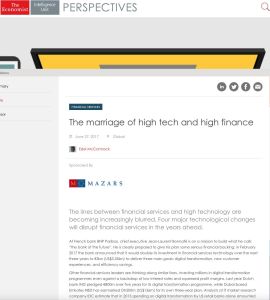Join getAbstract to access the summary!

Join getAbstract to access the summary!
The Economist Intelligence Unit
The Marriage of High Tech and High Finance
EIU, 2017
What's inside?
Financial services giants have begun to take the lead in developing disruptive technologies.
Recommendation
The year 2017 brought a consequential shift in fintech investing, with a retreat in private funding for technology company start-ups and the advance of financial services giants pouring billions of dollars into innovations that will affect customer interactions. According to this solid roundup from the Economist Intelligence Unit, transformative improvements are possible in four broad technology areas. getAbstract recommends this accessible overview of future fintech directions to executives in banking, insurance and other financial services industries.
Summary
About the Author
The Economist Intelligence Unit is an independent research and analysis organization.




















































































































Comment on this summary
The current financial systems of capital investments/ depreciation etc. seem to prevent us from taking a step back from what has been built and rebuild/ innovate in a completely new direction for even better benefits?